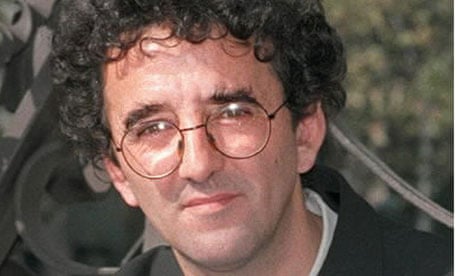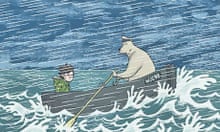Roberto Bolaño has been dead since 2003, but he remains the planet's most prolific novelist. Every six months, it seems, we are gifted a fresh masterpiece, or near miss, by the Chilean wizard, who, after a well-spent youth (drugs, global wandering, political struggle), finally settled down in early middle age to pass his last decade on earth (he died from liver failure at the age of 50) augmenting world literature.
That the anglophone world should experience Bolaño's oeuvre as a posthumous phenomenon is entirely appropriate, for his books are all about the obscure spell cast by the dead over the living. In a mordantly representative moment from one of his stories, a man and a woman are sitting in a restaurant leafing through a decades-old, long-since-defunct literary magazine. On the last page are printed the names of contributors to the forthcoming issue – Jean-Jacques Abrahams, Pierrette Berthoud, Sylvano Bussotti, William Burroughs – which the woman reads aloud "with a mocking smile". The man sits there in silence. "They're all dead," he thinks to himself.
Written in 1989, shortly after Bolaño had settled in the Spanish resort town of Blanes, and unpublished in the author's lifetime, The Third Reich was recently discovered at the bottom of a drawer – which, at first glance, would seem to be the ideal place for it. The novel represents one of the author's first goes at fiction, and it clunks and sputters with all the awkwardness you would expect from an apprentice work. At least part of this awkwardness can be laid at the door of our narrator, Udo Berger, a 25-year-old German who, together with his statuesque girlfriend, Ingeborg, is spending the last weeks of summer in a Costa Brava resort town.
Lofty, irascible and single-minded, Udo has the temperament of an artist, though his vocation is rather less exalted. He is a gamer, which is to say he plays grand strategy war games – like Risk, apparently, only much more complicated – and he takes it all very seriously. Not only has he recently gone "semipro", he is also the national champion, a fact of which he likes to remind us, and – we quickly get the feeling – himself.
Like many narrators before him, Udo has just decided to begin keeping a diary ("the urge to write, to set down the events of the day, keeps me from getting into bed and turning out the light"), a practice he sticks to for the next 270-odd pages. "I don't think it's an exaggeration to say that my life has never been better," Udo writes, with ominous complacency, in his first entry.
Trouble arrives the very next day, in the form of Hanna and Charly, another pair of young Teutonic holidaymakers, whom Udo and Ingeborg quickly fall in with. Through their new friends, they are introduced to some of the seedier denizens of the town, a pair of beach bums known only as the Wolf and the Lamb, and El Quemado, "the Burns Victim", the proprietor of a pedal-boat rental business, whose hideously scarred face, a bit like the severed ear at the start of Blue Velvet, is one of the first signs we get that this apparently idyllic seaside setting is in fact a writhing snake pit of violence and deceit.
Charly, an erratic misogynist who likes his drink, is the character who does most to fuel the engine of plot. One day, in an event that is rather laboriously foreshadowed, he goes windsurfing and doesn't return. Days pass. Hanna, overcome with grief, goes home to Germany. Then Ingeborg does the same. For some reason, Udo decides to stay put. It seems he is unable to leave until Charly's body is washed up, but why this should be isn't clear. Leaving the motive opaque, Bolaño allows a disquieting ambiguity to seep into his narrative.
From here on in – and we are still not yet halfway through – the book rations incident almost to the point of starvation. As in a film by Antonioni, what we are left with – what we are forced to get by on – is atmosphere, pages and pages of the stuff. Udo loiters on the beach, flirts with the hotel manager, and starts playing a wargame called Third Reich with El Quemado. Although Bolaño milks some unexpected comedy from Udo's geekish fanaticism – "my movements in the East and the Balkans (after the classic play: the obliteration of Yugoslavia and Greece) make him fear an impending invasion of the Soviet Union" – the game never quite reverberates with the menace Bolaño seems to have intended.
Nevertheless, it is in its second half that the book starts to repay our attention. With passages that anticipate the dark, chaotic splendour of By Night in Chile, Udo's diary becomes a record of moral and psychological disintegration, swarming with toxic hallucinations and poignant non sequiturs. Something hidden from us, something hidden from Udo himself, seems to be hollowing him out.
Near the end, holed up in his hotel room, he speaks on the phone to his friend and war games mentor, Conrad, who is trying to understand why Udo doesn't come home. "'Did you get a letter from me?' Udo asks. 'I think I explained everything in it.'
'All I've gotten are two postcards, Udo. One of the hotels on the beach and another of a mountain.'
'A mountain?'
'Yes.'
'A mountain by the sea?'
'I don't know! All you can see is the mountain and a kind of monastery in ruins.'
'Anyway, you'll get it. The postal system is terrible here.'
Suddenly I realised that I hadn't written any letter to Conrad."







Comments (…)
Sign in or create your Guardian account to join the discussion